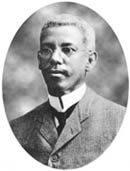|
|
Para ver este documento
en español, oprima aquí.
Puerto Rico Profile: José Celso Barbosa
December 3, 1999
Copyright © 1999 THE PUERTO RICO HERALD. All Rights Reserved.
 José Celso
Barbosa is one of the giants of Puerto Rican history, a man who
aspired tirelessly for the success of himself and his people.
A Puerto Rican of African descent, Barbosa had to overcome racism
and discrimination throughout his life. He lived for 64 years,
from 1857 to 1921, during which the people of Puerto Rico waged
an ongoing struggle for social and political freedom. He was born
in Bayamón, the son of a bricklayer in what was then a
corner of the Spanish Empire. He died an influential physician,
a great Puerto Rican, an American citizen, and one of the most
important black men of his time. José Celso
Barbosa is one of the giants of Puerto Rican history, a man who
aspired tirelessly for the success of himself and his people.
A Puerto Rican of African descent, Barbosa had to overcome racism
and discrimination throughout his life. He lived for 64 years,
from 1857 to 1921, during which the people of Puerto Rico waged
an ongoing struggle for social and political freedom. He was born
in Bayamón, the son of a bricklayer in what was then a
corner of the Spanish Empire. He died an influential physician,
a great Puerto Rican, an American citizen, and one of the most
important black men of his time.
100 years ago, on July 4, 1899, Barbosa was the founder of
the Republican Party of Puerto Rico. The moment marked the culmination
of Barbosa's vision for the future of Puerto Rico, a future in
which liberty and opportunity would be guaranteed through permanent
union with the United States. A century after that pivotal moment
in Barbosa's life, it is instructive to consider briefly the roots
of his belief in statehood for Puerto Rico.
All his life, Barbosa was an underdog. Like anyone who manages
to succeed against great odds, he had unrealistic and improbable
goals, and he turned them into realities. Time and again, he overcame
enormous obstacles through a combination of vision, talent, and
determination. As he found personal success, he used these same
attributes to work for the future of Puerto Rico.
The driving force of Barbosa's early years was his Aunt Lucía
Triano, or "Mamá Lucía." She recognized
the potential in the young "Pepito," and devoted herself
to his education. Thanks to her patronage and his considerable
talent, Barbosa was admitted in 1870 to the Seminario Consiliar
de San Juan, the only secondary school on the island. At this
Jesuit institution, Barbosa was ridiculed for being poor and black;
yet he excelled at the rigorous classical curriculum despite the
hostile environment.
For the next step in his education, Barbosa was sent on a sugar
boat to New York, where he learned English with the intention
of studying at Columbia University. When Columbia rejected him
because of his race, he turned instead to the University of Michigan,
where he studied medicine.
While at Michigan, Barbosa developed a deep and life-long affinity
for the American political system and its principles. He noted
that Thomas Jefferson had urged a nephew to learn Spanish because
of its role in the foundation of American civilization. He also
greatly admired Abraham Lincoln, emancipator of the slaves and
champion of the values that gave Barbosa his opportunity to excel.
In 1880, Barbosa received his degree in medicine from the University
of Michigan. He was the top student in his class.
When he returned to Puerto Rico later that year, Barbosa once
again met with resistance, this time while trying to establish
a medical practice. Once again, however, his skill and determination
broke through the barrier of race, and he became a prominent physician.
Toward the end of the 1880s, Barbosa entered politics as a
member of the secret societies aiming to undermine the Spanish
colonial presence. As he later recounted, the purpose of these
societies which nurtured a generation of Puerto Rican leaders
was to work for "the assistance, the protection, and
the mutual defense between the Puerto Ricans for their material
and moral progress, in order to safeguard their precarious economic
situation, and so that they could once again be owners, even of
a small portion, of the sources of wealth of their land."
A decade later, Barbosa came to believe that these goals could
be best attained through union with the United States. He saw
in the United States despite serious flaws in execution
a system and structure with the ability to establish and
insure freedom. Thus in 1898, speaking for a group of autonomists,
he wrote: "We aspire to be another State within the Union
in order to affirm the personality of the Puerto Rican people."
What he wanted was not assimilation but true power through the
rights attendant to statehood.
Barbosa was undoubtedly a man ahead of his time. He championed
education and health issues with as much emphasis as we discuss
these issues today. Moreover, he shattered the limited conceptions
of what it meant in the 19th Century to be black and to be Puerto
Rican; and in doing so, he became a great black man, a great Puerto
Rican, and a great American.
|

